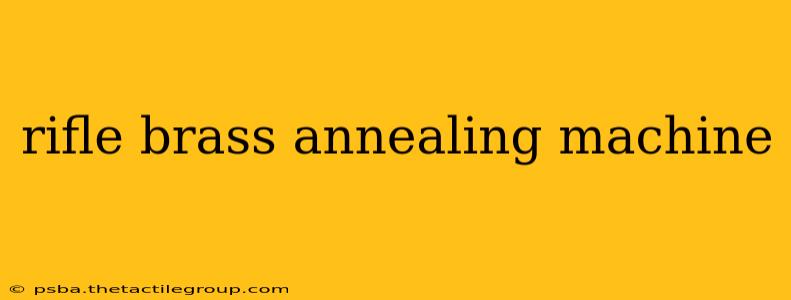Annealing rifle brass is a crucial step in reloading, ensuring consistent case life and preventing splits or cracks during resizing. While you can anneal brass by hand using a torch, a rifle brass annealing machine offers significant advantages in speed, consistency, and ease of use. This guide will explore the benefits of using a machine, the different types available, and factors to consider when choosing one for your reloading needs.
Why Use a Rifle Brass Annealing Machine?
Hand annealing, while possible, is time-consuming and prone to inconsistencies. A rifle brass annealing machine offers several key benefits:
-
Speed and Efficiency: Machines significantly reduce the time needed to anneal large batches of brass, making reloading a far more efficient process. This is especially beneficial for high-volume reloaders.
-
Consistent Results: Machines provide even heating, ensuring all areas of the brass case reach the optimal annealing temperature. This leads to more uniform annealing and improved case life.
-
Ease of Use: Once set up, machines automate the annealing process, minimizing the skill and precision required for hand annealing. This is particularly helpful for beginners or those with limited experience.
-
Reduced Risk of Damage: Hand annealing carries a risk of overheating or uneven heating, potentially damaging the brass. Machines mitigate this risk through precise temperature control and even heat distribution.
Types of Rifle Brass Annealing Machines
Several types of rifle brass annealing machines are available on the market, each with its own strengths and weaknesses:
1. Induction Annealers:
These machines use electromagnetic induction to heat the brass, offering rapid and even heating. They are often considered the most efficient and consistent method, but they also tend to be the most expensive. Induction annealers typically provide precise temperature control, allowing for fine-tuning to different brass alloys.
2. Electric Resistance Annealers:
These machines use electric resistance heating elements to heat the brass. They are generally more affordable than induction annealers but may not offer the same level of speed and precision in heating. Electric resistance annealers are a good middle ground between affordability and performance.
3. Gas Annealers:
These machines utilize propane or other gas flames to heat the brass. While cost-effective, gas annealers require more careful monitoring and skill to prevent uneven heating and potential damage to the brass. Gas annealers are less precise than electric options but remain a popular choice for budget-conscious reloaders.
Factors to Consider When Choosing a Machine
Several factors should influence your decision when purchasing a rifle brass annealing machine:
-
Budget: Prices vary significantly depending on the type and features of the machine. Set a realistic budget before beginning your search.
-
Capacity: Consider the volume of brass you typically anneal. Choose a machine with a capacity that meets your needs without being unnecessarily large or expensive.
-
Ease of Use: Opt for a machine with a user-friendly interface and clear instructions. Simpler operation will save you time and frustration.
-
Temperature Control: Precise temperature control is crucial for consistent results. Look for a machine with adjustable temperature settings and accurate temperature monitoring.
-
Durability and Build Quality: Choose a machine from a reputable manufacturer known for producing high-quality, durable equipment.
Conclusion
Investing in a rifle brass annealing machine can significantly improve the efficiency and consistency of your reloading process. By carefully considering the different types of machines and factors mentioned above, you can select the best option to meet your specific needs and budget. Remember to always follow the manufacturer's instructions and safety precautions when using any annealing machine. Proper annealing ensures the longevity of your brass and the accuracy of your ammunition.

